General
MURBS Trustees Declare 11.05% Interest on Members Balances for the FY 2021/2022
Published
3 years agoon
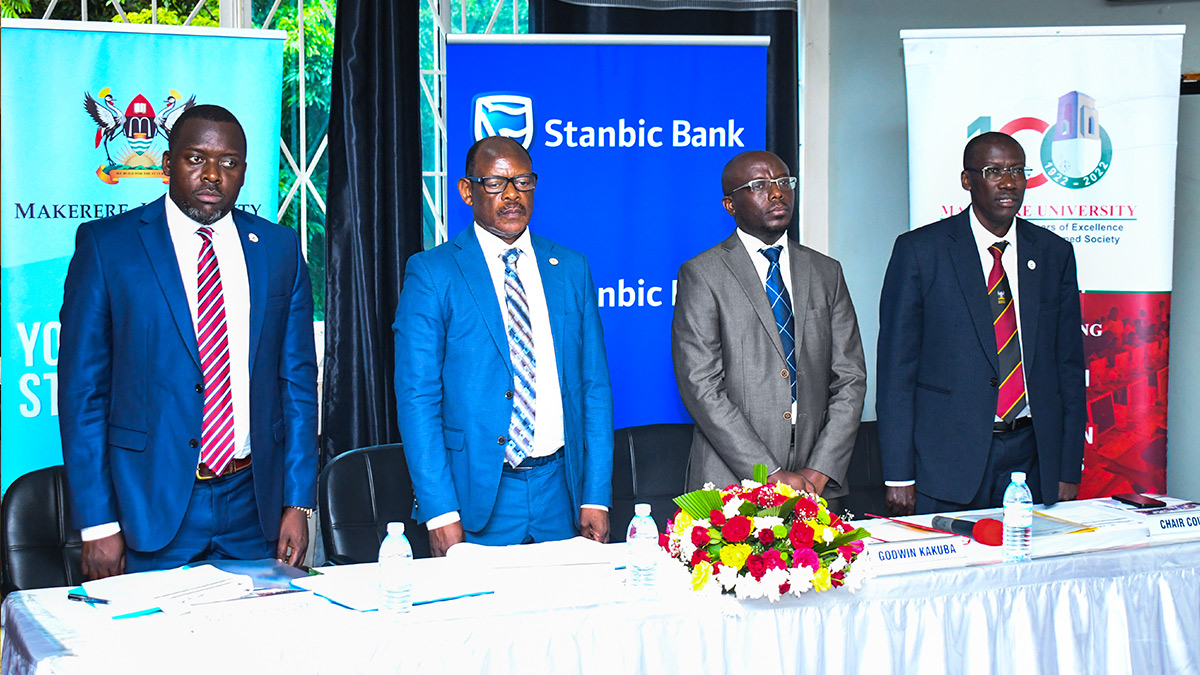
The Board of Trustees for the Makerere University Retirements Benefits Scheme (MURBS) has declared an interest of 11.05% on members’ balances for the financial year starting 1st July, 2021 to 30th June, 2022.
The Chairperson of the Board of Trustees, Dr. Godwin Kakuba made this declaration during the Presentation of the MURBS Performance for the Financial year ending 30th June 2022 to members of the University Council and Management at a meeting held on 18th October 2022 at Makerere University Telepresence Centre, Senate Building. The meeting was graced by Makerere University Council Members, the Vice Chancellor and members of management, the CEO Uganda Retirements Benefits Authority Mr. Martin. A Nsubuga, the CEO of the Insurance Company of East Africa and leaders of staff associations. Other members present were Trustees of MURBS, MURBS departmental Ambassadors, staff of Makerere university and MURBS among others.
On behalf of the Board of Trustees, Dr. Kakuba highlighted that given what has been happening on local and international market and the impact caused by the COVID pandemic, the declared interest is above the inflation rate implying that members contributions have been well preserved. He revealed that for 1,116 members of staff, the interest generated through the scheme investments and credited on their accounts is more than contributions received from the university.
The Board also confirmed that Makerere University remitted all the contributions that were due for the entire Financial year. Members funds grew from UGX 255bn to 299bn supported by the increase in contributions and positive returns from investments and is projected to hit a trillion by 30th June 2026.
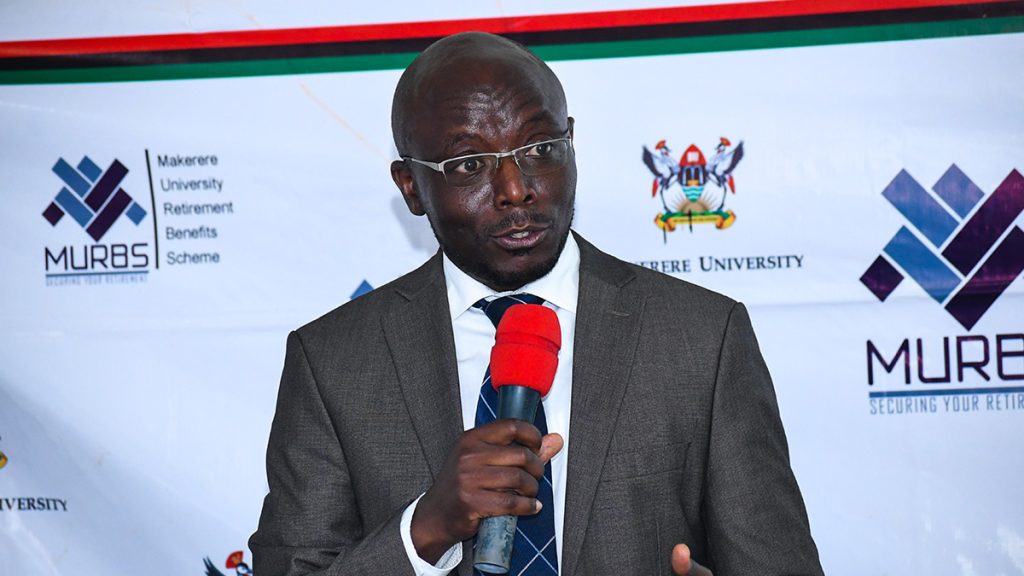
Dr. Kakuba reported that the schemes accounts were audited by PricewaterhouseCoopers Certified Public Accountants who issued unqualified opinion on the financial statements. He said the scheme membership increased by 1000. As at 30th June 2022, the scheme had 7, 162 (active 3,093 and Deferred -4,069) members compared to 5,984(Active -2007 and Deferred -3907) as at 30th June 2021.
“The Trustees collected contributions totaling UGX 33.5bn as compared to UGX 24.5bn for the FY 2020/2021. Out of the 33.5bn, UGX 29.4bn was paid in respect of staff of Makerere university on main payroll except UGX 82.5m. The Trustees appreciate this compliance and are also grateful for the plans drawn to settle the difference. The Trustees thank the Makerere University for honouring these obligations,” he commended.
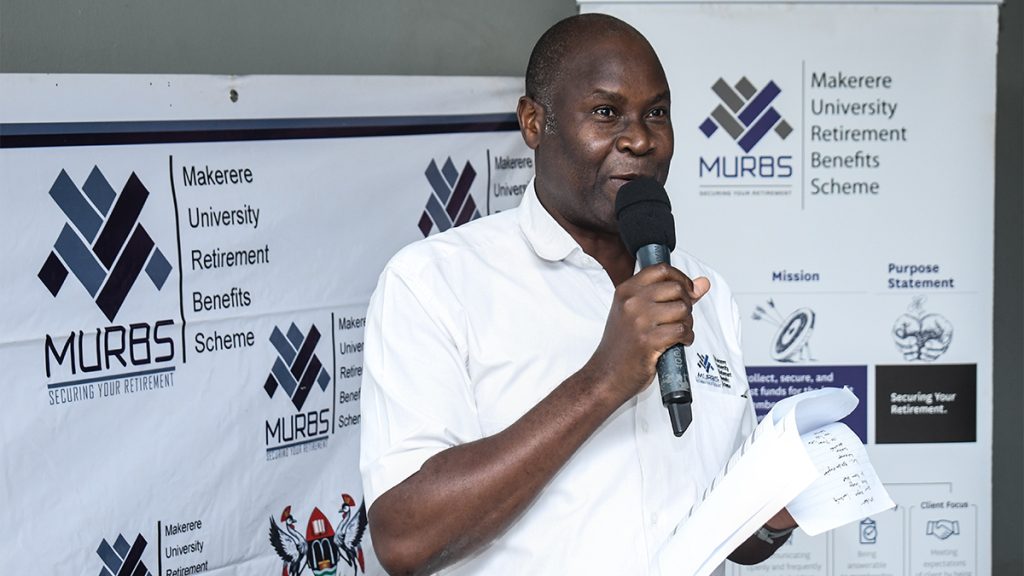
Dr. Kakuba appreciated the University Management for the progress made towards debt recoveries. The Trustees recovered UGX 6.5bn in respect of the In-house debt and thus, combined with UGX 5bn paid by Government on 20th May 2021, the scheme recovered UGX 11.5bn by 30th June 2022. Dr. Kakuba reported that on 4th August 2022, the Government paid UGX 1.5bn, bringing the cumulative amount recovered to UGX 13bn representing 51% total debt recoveries expressing hope that the balance of 12.4bn will also be cleared.
“The members’ funds grew from UGX 255bn at the start of the FY 2021/2022 to UGX 299bn at the end. This growth was supported by the increase in contributions and positive returns from investments. During the year, trustees approved investments in Unit Trusts which created an avenue for the scheme to maximise opportunities for daily cash contributions. The scheme’s strategy to significantly divest from equities continues to cushion our assets against volatility.” part of the statement reads.
Reporting on the effect of Fund value and return on investment on individual members, Dr. Kakuba noted that MURBs now has a member holding benefits in excess of UGX 400m while the average of the top five holdings exceeds UGX 398m. He promised that the Trustees will strive to push the member with the biggest member holding to hit 0.5bn mark over the next 12 months.
Kakuba also reported that for the past years the scheme has been voluntarily participating in Financial Reporting competitions to gauge its standard of financial reporting as compared to other financial institutions in the country with emphasis on the disclosures made in the report, governance, sustainability, communication and presentation of the accounts.
“With respect to the 2020 Annual report, MURBS again emerged winner in the Retirement Benefits Sector category. These awards are a confirmation that MURBS is on the right course. We are proud to have our scheme as a leader of the pension scheme,” said Dr. Kakuba.
Chairperson of Council satisfied with the interest of 11.05%, cautions staff on Mid Term
Access
In a speech read by Prof. Frank Mwine, the Chairperson Makerere University Council Mrs. Magara congratulated MURBS upon its consistent commitment on accountability to the stakeholders, subjecting the books accounts for auditing by a reputable firm, participating in the Financial reporting competitions and winning five awards.
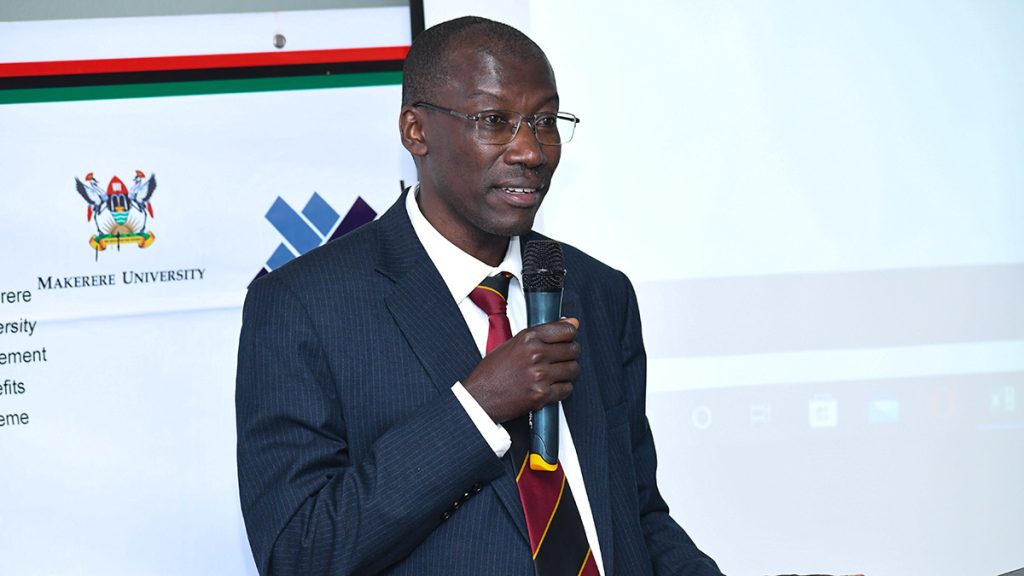
The Chairperson of Council commended the Trustees for the positive performance indicators, a growing fund and membership, diversified investments, the growing net return on investment and competent return on investment. As leaders in the pension sector, the Chair implored the scheme to keep the position and support other retirement benefits schemes in Uganda to improve.
“I have noted that you have declared less interest this year than last year., but considering the economy and market conditions during the 2021/2022 Financial Year, I am satisfied that the interest 11.05% is a good return. So, our Trustees have done very well and as Council, we agree that this performance has added value on each members holding in MURBS.”
The Chairperson of Council reminded the Trustees to be aware that handling mandatory contributions requires a great deal of care. She implored the Trustees to take the highest level of due diligence as they work with service providers in the sector noting that there is no greater pain to an employee than to be told some of the money was lost in some not-so-clear investments.
In her speech, Mrs. Magara also encouraged staff and retirees not to spend a big part of the retirement package and to take advantage of the MURBS Annuity program in order to have a comfortable retirement. She reasoned that given the rate at which the scheme fund is growing, and the benefits they have, it’s likely that annuity pay-outs will soon be able to match a retirees exit salary for many members. She asked Trustees to sensitize members on the benefits of annuities.
The Chairperson of Council reminded MURBS members that there has been early access to retirement benefits before in Makerere and this has been one of the main reasons senior staff may be still having smaller packages for retirement and some members ending up accusing the university for giving them peanuts at the end of service.
Mrs. Magara cautioned and expressed concern about whispers of MURBS members getting early access to and part of their retirement money on the pretext of hardships faced during the lockdown years of COVID 19.
“I am not convinced this is a good idea for the members of MURBS since the university was able to pay full salaries during that time. The idea of midterm access coming out of a one–time event called COVID 19 should not become entrenched into long term scheme rules. I will therefore caution you to be very careful with this idea and sensitize members of MURBS,” she guided.
MURBS performance-a relief and in line with Council’s objectives – Mak VC
Describing MURBS as the brain child of the Makerere University Council established 12 years ago, the Vice Chancellor Prof. Barnabas Nawangwe said the purpose was to ensure that staff lived decent lives in retirement. Prof. Nawangwe reported that the status of the scheme was last year boosted when the Minister of Finance, Planning and Economic Development exempted the University from mandatory contributions to NSSF, making handling of mandatory retirements benefits easier and adding value to the university employees.
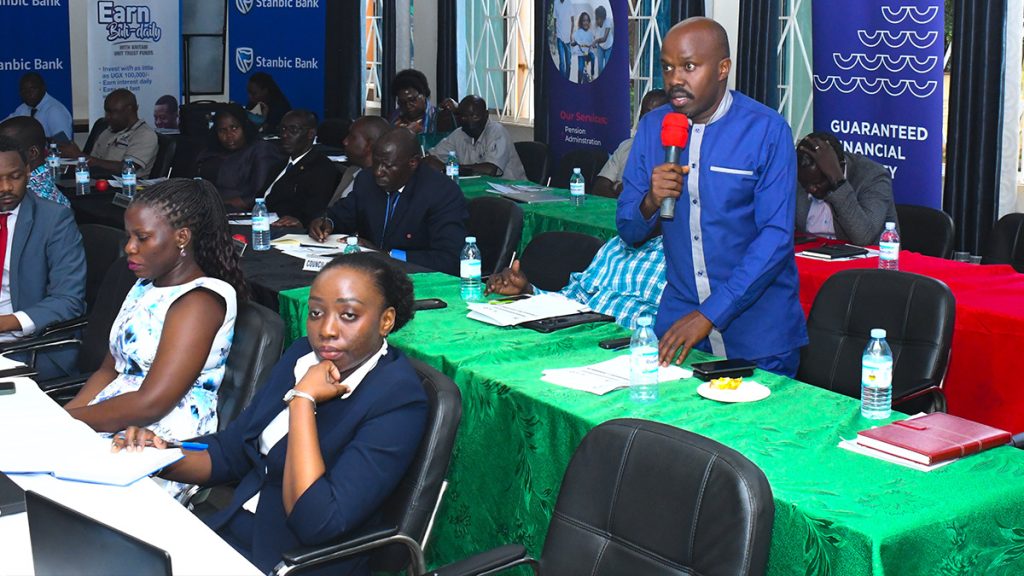
Prof. Nawangwe congratulated the Trustees upon the excellent performance saying, the good results presented met the original objectives of the University Council. “It is so gratifying to hear that there are more than 60 employees whose retirement packages are over 300m but are still working and some still below 50 years. This was unthinkable a few years ago. It is good to hear that over 1000 individuals have received more interest than their contributions in this financial year. This is a big achievement for a University that used to suffer negative publicity on the basis of retirement packages of her employees,” Prof. Nawangwe stated.
Prof. Nawangwe recalled that 12 years ago MURBS started with less than UGX 20bn but now holds, over UGX 300bn and receiving monthly contributions over UGX 2bn. He reminded participants that this is part of the potential he was referring to while starting his first term as Vice Chancellor.
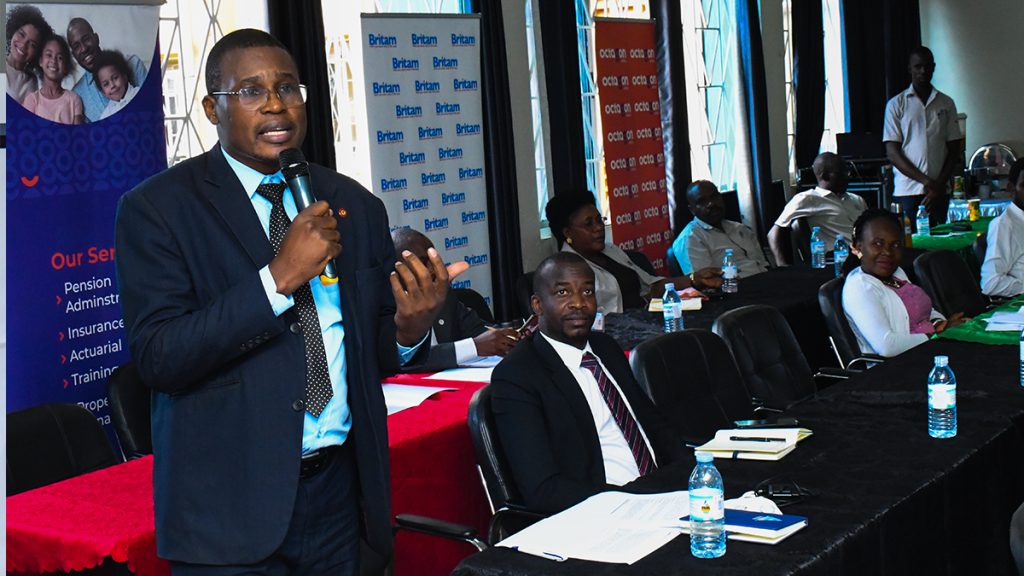
“You may also recall that unlocking the potential within Makerere University was top of my agenda. In the case of social security of staff, this is being done every month when more than UGX 2bn is invested by our own scheme and for repayment of university debt. In addition, I promised to prioritise repayment of university debt.”
The Vice Chancellor, expressed happiness that the University with support from Government completed paying all debts for the period between 2005 and 2011 and has now repaid UGX13bn of in-house debt pledging that the balance is expected to be cleared in less than two years.
Vice Chancellor challenges staff to face the challenges of the century squarely
Turning to the staff, the Vice Chancellor stressed that with the completion of celebrations of 100 years of excellent service to humanity, Makerere University has a firm foundation on which to build.
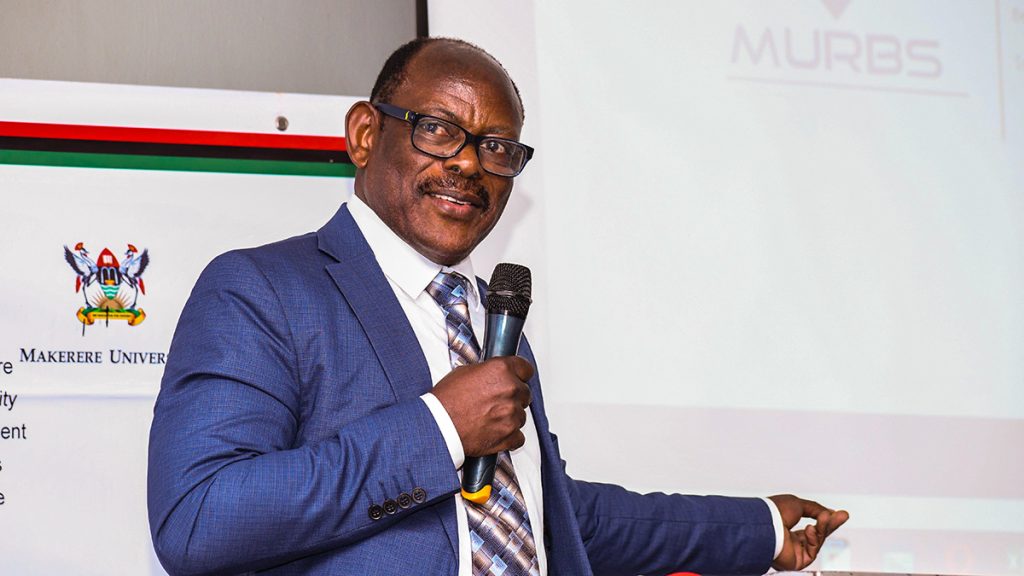
“It is now time to face the challenges of the century squarely. We owe it to the Ugandan tax payer and to the Government of Uganda to come up with innovations that will solve the problems that our people are facing,” Prof. Nawangwe said adding:
“The Government has consistently been increasing funding towards universities. So, Universities too, and Makerere in particular, need to support government development programmes for the country by finding real solutions that impact lives and transform society. Let us nature the good relationship that exists between Government and Makerere university,” Prof. Nawangwe said.
Prof. Nawangwe commended the University Council and Management for the support accorded to MURBS saying, they have worked with the Trustees over many complicated matters and were going to continue working together in other matters such as the amendment of the Trust Deed of MURBS as the new dispensation requires.
MURBS has a formidable team and experts –CEO UBRA
The Chief Executive Officer Uganda Benefits Regulatory authority, Mr. Martin A. Nsubuga congratulated Makerere University upon holding the centennial celebrations successfully. Mr. Nsubuga also congratulated the MURBS for the wonderful performance.
“For people in this Market, declaring the interest of 11. 05% in the era of COVID and the market dynamics that were present, I really have to congratulate you. You have a very good formidable team with very good experts.”
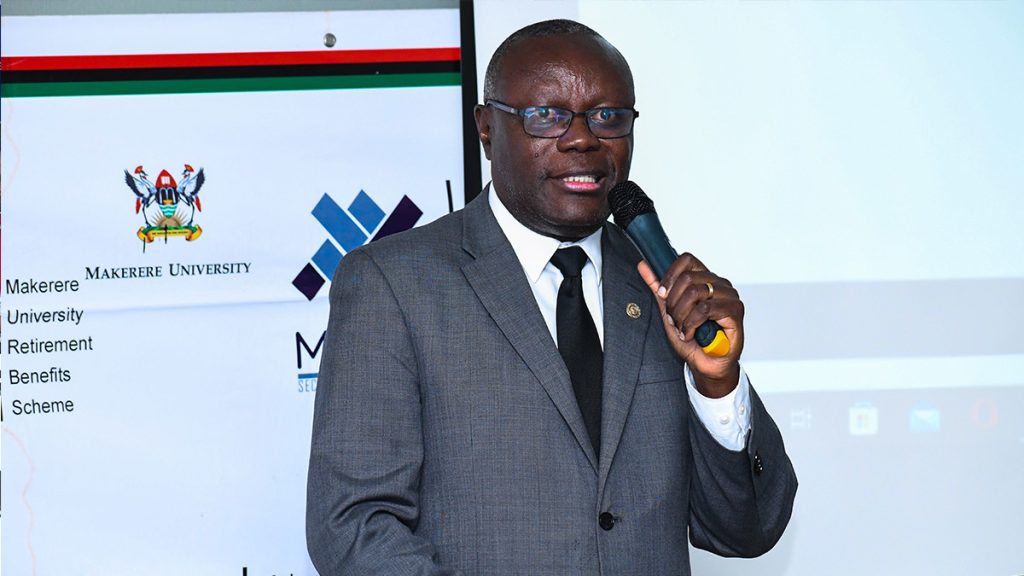
Re-affirming the position of the Trustees on the interest declared and investments made, Mr. Nsubuga said: “On our side, we can only confirm that the numbers that have been declared are consistent with what we had anticipated. Just to confirm to you when we came here we know where your money is invested with almost 80 % in fixed assets and we know how they are trading, we had an idea and we would have been disappointed if they had declared anything less than 10%.”
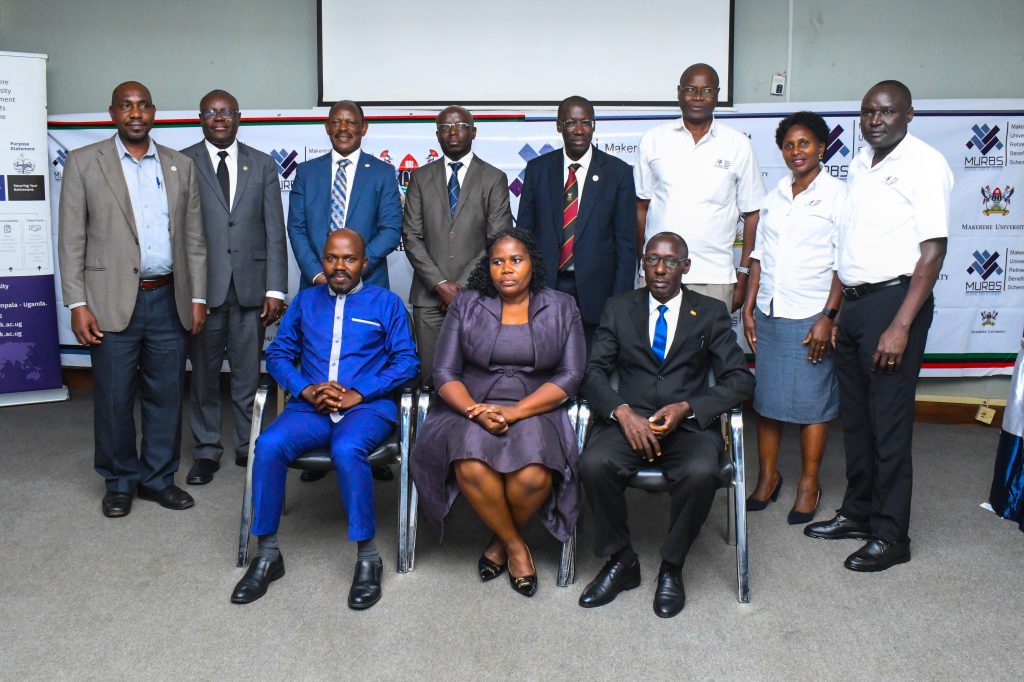
Mr. Nsubuga commended MURBS Trustees for upholding good governance standards saying, they are reliable, the reason why they were recommended to become an in dependent pension scheme.
He said as a regulator, they were proud of MURBS credibility in her Financial statements describing the performance as unrivalled as far as the standard, disclosures and the returns are concerned.
He appreciated the University Management and Council for the support rendered to the scheme, fulfilling the contribution obligation and enabling the scheme to operate and perform without influence.
Mr. Nsubuga also commended the schemes foresightedness. He implored staff and Trustees to make an arrangement to work with ICEA and and purchase annuities so that they can receive monthly payments throughout their lifetime.
By: Jane Anyango and Ritah Namisango
You may like
-


Call For Applications: MakNCD Masters and PhD Training Opportunities
-


Holistic Retirement Planning includes Psychological, Emotional & Social well-being across all Career Stages
-


Makerere University Leaders Call for Excellence in Research and Supervision as Academic Staff and PhD Students Receive Certificates
-
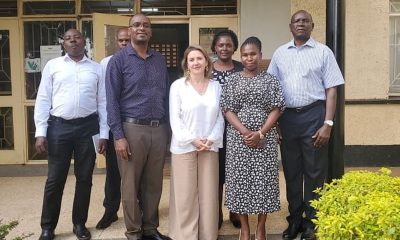

Department of Tourism Hosts Prof. Sofia Asonitou
-
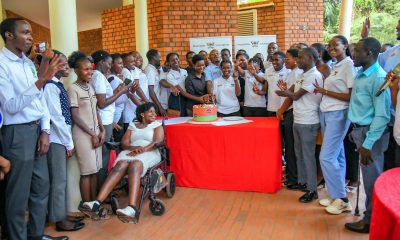

A Night of Celebration: Safeguarding Champions Mark Semester One Milestones
-
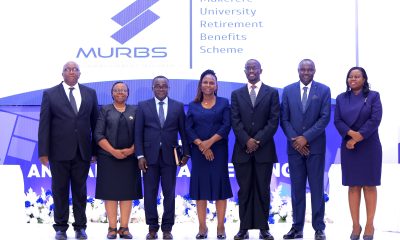

MURBS Declares 13.56% Interest for FY 2024/2025
General
Graduation marks the next phase of accountability, graduates told
Published
22 hours agoon
February 25, 2026
“A degree is not a finish line. Graduation is not the end of learning, It is the beginning of accountability,” Prof. Nicholas Ozor, the Executive Director of the African Technology Policy Studies Network Nairobi, Kenya (ATPS), said.
Delivering a keynote address under the theme ‘Knowledge with purpose’, during Makerere University’s 76th graduation ceremony on Tuesday 24th February, Prof Ozor, challenged graduates to see their degrees not as status symbols, but as instruments of responsibility.
In his speech, he painted a candid picture of the world the graduates are stepping into, one marked by climate change, technological disruption, inequality, food insecurity and the rapid spread of misinformation. Yet rather than framing these challenges as obstacles, he described them as opportunities for purposeful leadership.
“Into this world, you step, armed with knowledge, credentials, and potential. Your degrees do not make you better than others. They make you responsible for others,” Prof Ozor, said.
Addressing graduands from College of Agricultural and Environmental Sciences (CAES)
College of Computing and Information Sciences (CoCIS), College of Education and External Studies (CEES) and School of Law (SoL), Prof. Ozor tailored his message to each field of study.
To graduates of the School of Law, he described the legal profession as a moral calling, urging them to use the law to protect the vulnerable and uphold justice with courage.
“Uganda, Africa, and the world do not need lawyers who only know how to argue. They need lawyers who know why they argue. Use the law to protect the weak, not intimidate them. Use your knowledge to defend justice, not delay it. Let integrity define your reputation not merely your résumé,” Prof Ozor, said.
For graduands who might feel that shortcuts will be tempting and silence will feel safer than truth, Prof. Ozor reminded them that justice does not need clever people, but courageous ones.
To the College of Education and External Studies, he underscored the transformative power of teachers, reminding them that classrooms shape nations long before policies do.
“Every nation rises and falls on the quality of its teachers. Never underestimate the power of a classroom. Teach not only for examinations, but for understanding. Teach not only content, but character. Teach learners how to think not what to think. Education is quiet work but its impact echoes across generations,” Prof Ozor, noted.
He called upon graduands from the College of Computing and Information Sciences, to use technology to solve African problems, not merely to imitate foreign solutions.
“Technology is powerful, but it is not neutral. Every line of code carries values. Every system you design affects real lives. Build for inclusion. Build for accessibility. Build for truth. Do not let innovation outrun ethics. The future will not belong to those who know the most technology, but to those who use it wisely,” He noted.
During the ceremony, Prof Ozor announced that the African Technology Policy Studies Network is offering PhD scholarships and postdoctoral fellowships in Artificial Intelligence, inviting deeper collaboration with Makerere.
For graduates of the College of Agricultural and Environmental Sciences, he highlighted their critical role at the intersection of sustainability and survival, calling on them to blend indigenous knowledge with scientific innovation to secure Africa’s food systems and protect its ecosystems.
In closing, he reminded graduands that their integrity will open doors their degrees cannot, their humility will teach them lessons success never will, and their resilience will matter more than their grades.
Five principles to be remembered:
- Embrace lifelong learning. The world changes too fast for static knowledge.
- Choose purpose over comfort. Impact matters more than income.
- Build character before career. Skills get you hired; character sustains you.
- Serve something larger than yourself. Give back to your communities and your country.
- Believe in Africa, and act. Do not wait for solutions from elsewhere. Be the solution.
General
Over 9,200 to graduate at Makerere University’s 76th Graduation
Published
1 day agoon
February 24, 2026
Pomp and colour defined the opening day of the Makerere University’s 76th Graduation Ceremony as thousands gathered to celebrate academic excellence and new beginnings.
The historic ceremony has brought together scholars, families, friends and industry partners in a vibrant celebration of achievement and possibility. Throughout the four-day event, the University will confer degrees and award diplomas to 9,295 graduands in recognition of their dedication and hard work.
Among the graduates, 213 will receive Doctor of Philosophy (PhD) degrees, 2,503 will graduate with Master’s degrees, and 6,343 will earn Bachelor’s degrees. In addition, 206 students will graduate with postgraduate diplomas, while 30 will be awarded undergraduate diplomas.
Of the total number of graduands, 4,262 are female and 5,033 are male. According to Vice Chancellor, this marks the first time in 15 years that male graduands have outnumbered their female counterparts.
The best overall graduand in the Sciences, Esther Ziribaggwa, graduated on the opening day with the Bachelor of Agricultural and Rural Innovation and an impressive Cumulative Grade Point Average (CGPA) of 4.77.

The ceremony marks a proud moment for Makerere University as it continues to nurture top-tier professionals across diverse fields.
While presiding over the graduation, the State Minister for Primary Education, Hon. Dr. Joyce Moriku Kaducu, on behalf of the First Lady and Minister of Education and Sports, Hon. Janet Kataaha Museveni, pointed out that Makerere University is a model institution, where leaders are nurtured, scholars are sharpened, and where dreams have been given direction.
In her address, Hon. Museveni, highlighted Government’s deliberate investment in research, innovation, and infrastructure to strengthen higher education in Uganda.
“The establishment of the Makerere University Research and Innovation Fund (RIF), supports high-impact research and innovation that directly contributes to national priorities and development. Through this initiative, thousands of researchers and innovators have pursued practical, scalable solutions that are transforming communities and key sectors across Uganda,” Mrs Museveni, said.
The Minister also noted that Parliament’s approved a USD 162 million concessional loan to upgrade science, technology, and innovation infrastructure at Makerere University. The funding will facilitate the construction of modern laboratories, smart classrooms, and state-of-the-art facilities for Engineering and Health Sciences, investments expected to position the University firmly within the Fourth Industrial Revolution.
“Government has embarked on the construction of a National Stadium at Makerere University and other institutions of higher learning across the country. This will promote physical education, strengthen talent identification, and boost investment in the sports sector,”

Turning to the graduands, the Minister encouraged them to see themselves not merely as job seekers, but as job creators and solution-makers.
Uganda and Africa need innovators who will modernize agriculture; engineers who will build quality infrastructure; healthcare professionals who will strengthen health systems; and educators who will inspire the next generation,” the Honourable Minister said.
She reminded graduates that they are entering a rapidly changing world shaped by Artificial Intelligence, climate change, and shifting global markets. To thrive, she advised them to remain adaptable, creative, and committed to lifelong learning.
She also encouraged graduates interested in entrepreneurship to tap into the Government’s Parish Development Model, which provides community-based financing and production support.
Quoting Proverbs 3:5–6, the Minister urged the graduates to trust in God as they embark on their next chapter.
She extended special appreciation to the Mastercard Foundation for its 13-year partnership with Makerere University in expanding access to education and empowering young people in Uganda and beyond.
In his speech, the Chancellor of Makerere University, Dr Crispus Kiyonga, urged graduands to harness research, innovation and technology to drive Uganda’s transformation.

“This is a milestone in your lives. You have invested time, discipline and hard work to attain these qualifications. It is important that you derive value from this achievement, not only for yourselves, but for your families and for society.” Dr Kiyonga, said.
Dr. Kiyonga expressed gratitude to the Government of Uganda for its continued financial support to the University, particularly the funding allocated under MakRIF, which he described as critical in strengthening the institution’s research capacity.
“Research plays a very vital role in the development of any community. Makerere as the oldest University in the country is doing a significant amount of research, However, more work is required to mobilize additional resources to further strengthen research at the University.” Dr Kiyonga, noted.
Acknowledging the challenges of a competitive job market, Dr. Kiyonga encouraged graduates to think beyond traditional employment pathways.
“It is true that the job market may not absorb all of you immediately. But the knowledge you have acquired is empowering. You can create work for yourselves, individually or in teams.” Dr Kiyonga, said.
He advised the graduands to embrace discipline, integrity and adaptability in the workplace, and to take advantage of technology and digital platforms to innovate and respond to societal challenges.
“Every development challenge presents an opportunity. Believe that you can apply your knowledge to create solutions with impact.” He said.
Addressing the congregation, the Vice Chancellor, Prof Barnabas Nawangwe, congratulated the graduands, particularly staff and societal leaders on their respective achievements.

“I congratulate all our graduands upon reaching this milestone. In a special way I congratulate the members of staff, Ministers, and Members of Parliament that are graduating today as well as children and spouses of members of staff,” Prof Nawangwe, said.
In his speech, Prof Nawangwe, recognized outstanding PhD students, particularly members of staff. who completed their PhDs in record time without even taking leave from their duties.
He called upon graduates not to despise humble beginnings but rather reflect on the immense opportunities around them and rise to the occasion as entrepreneurs.
“You are all graduating with disciplines that are needed by society. We have equipped you with the knowledge and skills that will make you employable or create your own businesses and employ others. Do not despair if you cannot find employment. Instead, reflect on the immense opportunities around you and rise to the occasion as an entrepreneur,” Prof Nawangwe, said.
Prof Nawangwe called upon the graduands of PhDs to use their degrees to transform the African continent.
“As you leave the gates of Makerere I urge you to put to good use the knowledge you have received from one of the best universities in the World to improve yourselves, your families, your communities, your Country and humanity. Let people see you and know that you are a Makerere alumnus because of the way you carry yourself in society with dignity and integrity. Put your trust in God and honour your parents and opportunities will be opened for you,” Prof Nawangwe, said.
Delivering a key note address, Prof. Nicholas Ozor, the Executive Director of the African Technology Policy Studies Network Nairobi, Kenya ((ATPS). Reminded the graduates that a degree is not a finish line but the beginning of accountability. “The world is a complex, fast changing and deeply unequal. Degrees make you responsible for others not better than them,” Prof Ozor, said.

The 76th Graduation Ceremony of Makerere University will be held from Tuesday 24th to Friday 27th February, 2026. A total of 213 PhDs (87 female, 126 male), 2,503 Masters (1,087 female, 1,416 male), 206 Postgraduate Diplomas (80 female, 126 male), 6,343 Undergraduate Degrees (2,999 female, 3,344 male), and 30 Undergraduate Diplomas (9 female, 21 male) will be graduating from all the Colleges.
Ms. Sarah Aloyo and Ms. Nakato Dorothy both students of the Bachelor of Procurement and Supply Chain Management emerged as the best in the Humanities and Best Overall students with a CGPA of 4.93. Mr. Ssewalu Abdul, a Bachelor of Leisure and Hospitality Management student emerged second best in the Humanities with a CGPA 4.90. Ms. Esther Ziribaggwa emerged as the best student in the Sciences with a CGPA of 4.77 in the Bachelor of Agricultural and Rural Innovation, while Mr. Simon Mungudit emerged second best in the Sciences with a CGPA of 4.76 in the Bachelor of Science in Petroleum Geoscience and Production.
Commencement Speakers
- Day 1 – Prof. Nicholas Ozor, the Executive Director of the African Technology Policy Studies Network, Nairobi, Kenya
- Day 2 – Prof. Dr. Maggie Kigozi, Chairperson Makerere University Endowment Fund Board
- Day 3 – Dr. Patricia Adongo Ojangole, Managing Director, Uganda Development Bank Limited
- Day 4 – Ms. Reeta Roy, Former President & Chief Executive Officer, Mastercard Foundation
The 76th Graduation Ceremony will be held at the Freedom Square following the schedule below:
Tuesday, 24th February, 2026
College of Agricultural and Environmental Sciences (CAES)
College of Computing and Information Sciences (CoCIS)
College of Education and External Studies (CEES)
School of Law (SoL)
Livestream Link for Day 1: https://youtube.com/live/wVGPA0FJ9pU
Wednesday, 25th February, 2026
College of Health Sciences (CHS)
College of Natural Sciences (CoNAS)
College of Veterinary Medicine, Animal Resources and Bio-security (CoVAB)
School of Public Health (SPH)
Thursday, 26th February, 2026
Makerere University Business School (MUBS)
College of Business and Management Sciences (CoBAMS)
Friday, 27th February, 2026
College of Engineering, Design, Art and Technology (CEDAT)
College of Humanities and Social Sciences (CHUSS)
Institute of Gender and Development Studies (IGDS)
Makerere Institute of Social Research (MISR)
Trending
-

 Humanities & Social Sciences3 days ago
Humanities & Social Sciences3 days agoMeet Najjuka Whitney, The Girl Who Missed Law and Found Her Voice
-

 Health1 week ago
Health1 week agoUganda has until 2030 to end Open Defecation as Ntaro’s PhD Examines Kabale’s Progress
-

 Agriculture & Environment6 days ago
Agriculture & Environment6 days agoUganda Martyrs Namugongo Students Turn Organic Waste into Soap in an Innovative School Project on Sustainable Waste Management
-

 General1 week ago
General1 week agoMastercard Foundation Scholars embrace and honour their rich cultural diversity
-

 Health2 weeks ago
Health2 weeks agoCall for Applications: Short Course in Molecular Diagnostics March 2026
